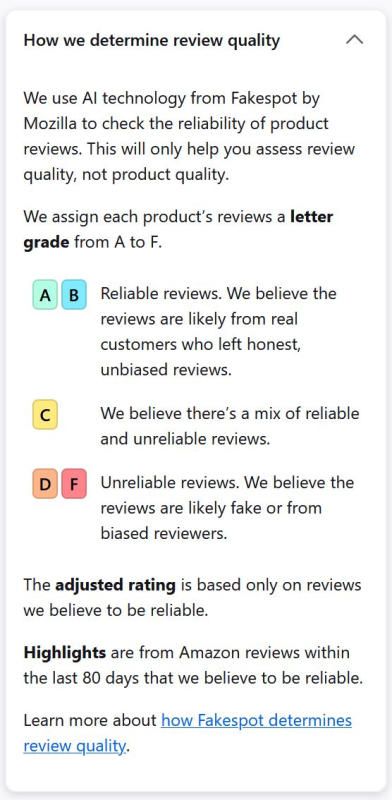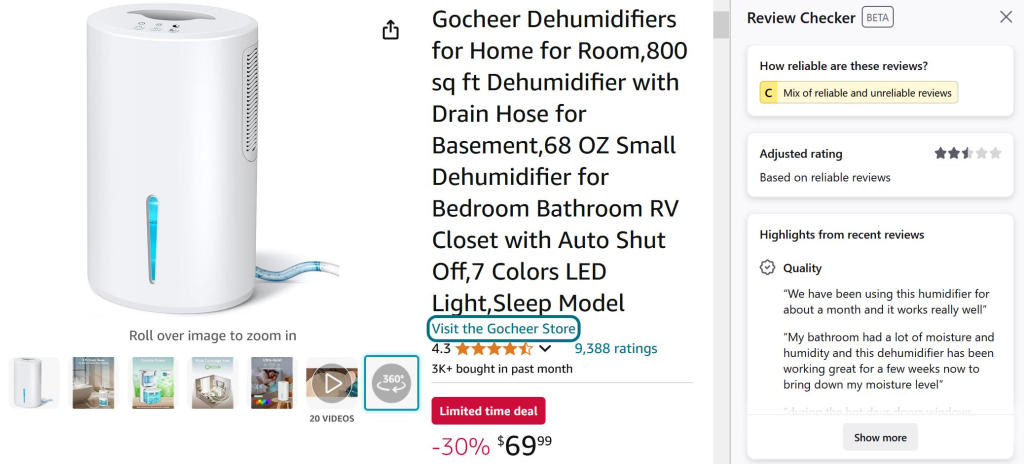
I vented last week that the best-selling brand of household dehumidifiers on Amazon (Gocheer) instructed someone to snail mail me a letter offering a $40 Amazon gift card if I posted a 5-star review and mailed proof to
I attempted to post a redacted photo of the letter (no personal information) plus a one-star review of the product on Amazon, but Amazon declined publication and banned me from ever rating the product – presumably, because (1) Amazon benefits enormously from the sale of thousands of $40 Amazon gift cards, and (2) publicizing the scam would question the credibility of all Amazon product ratings, as well as the company’s asserted commitment to “honesty”. There are, of course, other channels for publicizing product scams and corporate malfeasance, but few Amazon customers consult them.
AI to the Rescue
I do not know whether other browsers led the way or will follow suit, but the open-source browser Mozilla (aka Firefox) recently introduced AI technology from Fakespot to make product ratings more reliable. The Fakespot sidebar extension assigned Gocheer a “C” rating for reliability and downgraded its 9,388 ratings from a composite average score of 4.3 to 2.5. Based on my own experience (2 of 3 units died within a year), an adjusted 2.5 rating seems appropriate. I hope, in the future, that all web browsers – including Android and OS-based – include an AI-assisted rating-adjustment sidebar.

Out of curiosity, I examined the adjusted score of various products I presumed unlikely to receive intensive (and unorthodox) “marketing” assistance from their manufacturer. First up? Ivory soap. Amazon lists twenty bars for $13.98. Fakespot adjusted the 2,464 ratings from a composite rating of 4.6 (yes, it was my parents’ favorite) to 5.0, and awarded P&G an “A” for reliability. Next: Crayola crayons. The $8.99 64-pack had just 163 ratings on Amazon with a composite score of 4.5. Fakespot’s adjusted score: 4.5 plus “A” for reliability.
How about something more expensive… an appliance? Amazon’s best-selling dorm-style refrigerator is the Upstreman 3.2 cubic foot mini fridge with freezer, listed presently for $139.99. Amazon reports 3,347 ratings with a composite score of 4.4. Fakespot agrees and assigns Upstreman an “A” for reliability.
Okay, but what about gadgets where startup companies invest a comparative fortune in branding, gadgets where consumers fret for days before choosing? The products that qualify for me are: solar generator units; solar panels; and tabletop electric “composters” – each because I am obsessive about reducing my environmental footprint but also not busting the bank or replacing gear within 10 years. For time’s sake, I will focus only on solar generators.
Four of my solar generators are from an “inexpensive” Chinese “knock-off” brand, AllPowers. Its generators are considerably cheaper than comparably-sized units from the industry leaders, Bluetti and Jackery, but they have served me well so far (knock on wood). Amazon lists the All Powers 2000W portable power station (the model I use) for $799. Amazon displays 30 ratings with a composite score of 4.4. Fakespot agrees and accords AllPowers an “A”-rating for reliability. Interestingly, the industry favorite – the Jackery Explorer 1000 – scores 4.5 on Amazon (141 ratings), but receives only a “B” from Fakespot for reliability, yet still registers an adjusted score of 4.4.
So, similar to bond ratings from Moody’s, there isn’t much difference between and “A” and “B”, but there is a huge drop in reliability when you receive a “C”. Analogizing further, buying dehumidifiers from Fakespot’s “C”-rating poster boy Gocheer is a lot like purchasing junk bonds. The dehumidifier could default (i.e., die) any moment. God, I love this extension. Thank you, Mozilla and Fakespot AI, for trotting it out.
Postscriptum
I had a panic attack before clicking “Publish”. How does Fakespot score ratings of my novels, Cooperative Lives and Toys in Babylon? What if they are branded fake? Yikes!
Thankfully, Fakespot judged the paltry 66 ratings for Cooperative Lives (composite score: 4.1) and even sorrier 8 consumer ratings for Toys in Babylon (composite score: 4.3) as 100 percent accurate. Not many fans, I know (Boy, do I know!), but at least they are genuine – a comforting solace despite lackluster sales.